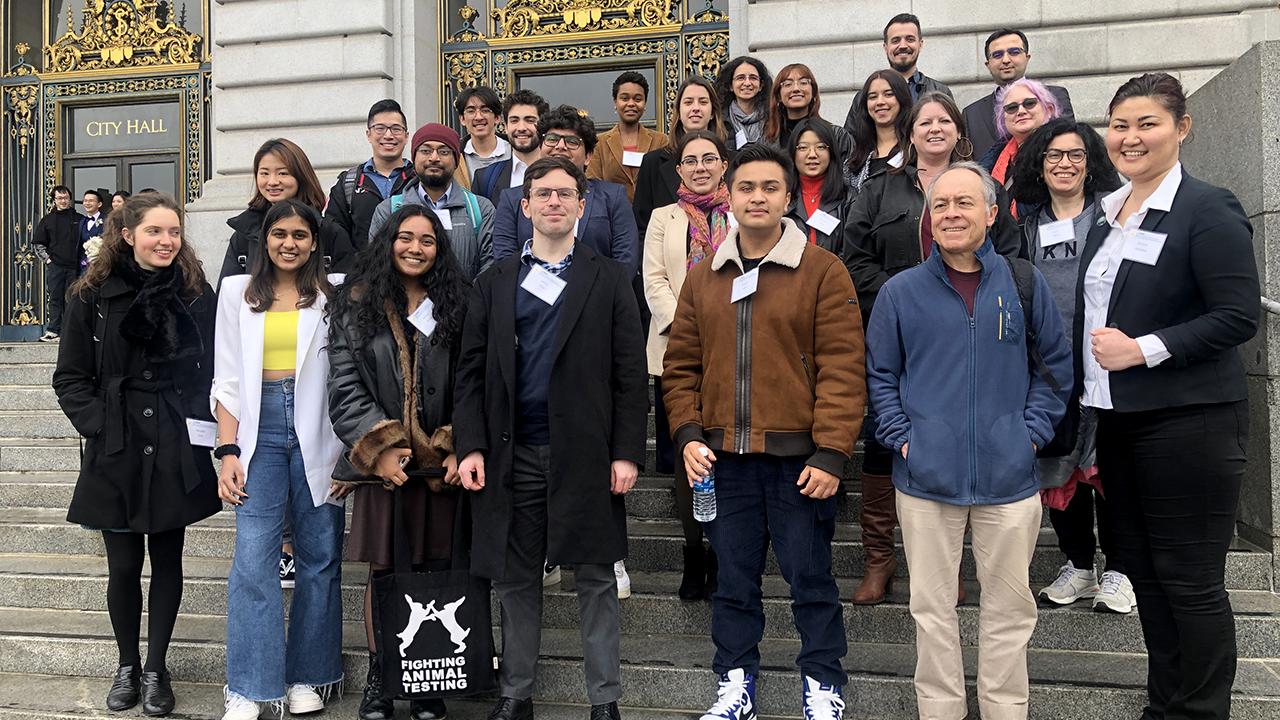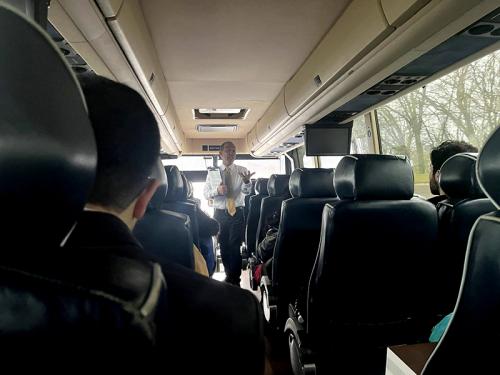
Lessons in Innovation from San Francisco's Mayor
UC Davis alumna London Breed shares experiences and insights with students
As a sophomore electrical engineering student, I've always been interested in the intersection of technology and government. When the opportunity arose to visit Mayor London Breed's office, I knew I couldn't pass it up.

Our day started with quick introductions and getting to know each other in front of Gallagher Hall, home of the the Graduate School of Management. Once we were on the bus and the highway, Joe DiNunzio, executive director of the Institute for Innovation and Entrepreneurship, went over the Mayor London Breed case study, and we had a great discussion about how the mayor got to her elected position today and how her values helped her get there. This discussion set the tone for the day, and I was excited to learn more.

Once we arrived at City Hall, we were greeted by Mayor Breed's advisors, Susanna and Eileen. They led us to a conference room and shared their experiences in City Hall and how their career choices led them there. Hearing about their unique paths to their current positions made me realize there are many ways to get involved in local government and create change. It was inspiring to see how dedicated they were to their work.
We then met Ellen Schumer, the City Hall historian, who gave us a tour of the building and showed us key rooms, like the Board of Supervisor’s Chamber. She told us how the Board of Supervisors consists of 11 representatives elected from districts around the city and operates similarly to the Paris government with arrondissements. The wood paneling in the Board Chamber is Manchurian oak, which is softer and easier to carve than California oak. No more forests of Manchurian oak are left in the world, so these carvings cannot be re-created.
More about our visit with Mayor Breed
We next explored the rotunda and admired the marble and limestone craftsmanship. We also explored the South Light Court, which contained exhibits that chronicle significant events in San Francisco history, like the historic Treasury of the City and the ceremonial shovel used by Mayor Jim Rolph to begin construction on the “New City Hall.” After the tour, we took the historic elevators back upstairs to meet Mayor Breed.

Upstairs, we were greeted by the mayor. She shared with us how she achieved her current position and what values she'd needed to get there, highlighting the importance of integrity and community engagement in leadership roles. Her discussion touched on how, even though she is not an entrepreneur, she must constantly think like an innovator to solve the city's problems. The innovative thinking approach involves identifying and combining existing cutting-edge solutions to solve a problem effectively. She also talked about some of her work with the city, like the Opportunities for All program, handling COVID-19 and creating incentives to bring large tech companies back to the Bay Area.
Innovation is about more than just thinking outside the box, but rather bringing together the building blocks of ideas to construct a solution greater than the sum of its parts. It's like assembling a mosaic of boxes, each unique but united in purpose.
One of the things that stood out to me was Mayor Breed's commitment to creating equal opportunities for everyone, especially youth and young adults in the Bay Area. She launched the Opportunities for All (OFA) initiative, which provides San Francisco's youth and young adults with access to career exploration and workforce development. It includes paid internships, mentorship and pathways to employment, such as job readiness, career training and apprenticeship, for participants aged 13 to 24. OFA focuses on equitable access to these opportunities through workforce connection.
The program is part of the City and County of San Francisco's efforts to address economic and systemic inequality, connecting high school students to paid internships, employment, training and educational opportunities. This initiative is part of Mayor Breed's broader roadmap for reforming public safety and addressing structural inequities in San Francisco. Funding for the OFA program comes from Mayor Breed's Dream Keeper Initiative, which reinvests $60 million annually into San Francisco's diverse communities.
My Key Takeaways from Meeting Mayor Breed
Ability to pivot
Mayor Breed has demonstrated a remarkable ability to pivot throughout her life and career. A prime example is her decision to change her UC Davis major from chemistry to political science, driven by a desire to make a more immediate impact in her community. This decision shows her willingness to adapt and change course when necessary, a quality that has served her well in navigating the challenges of governing a major city. Her willingness to pivot and embrace new solutions has also been evident in her approach to issues like homelessness, where she has been willing to try innovative approaches like Project Roomkey and the Street Crisis Response Team to address this complex issue.
Finding the source of the problem
Mayor Breed strongly believes in finding the source of a problem rather than relying solely on advisors. She is known to go to the problem herself and become the primary source of information. For example, during the COVID-19 pandemic, she personally visited businesses to assess their compliance with health guidelines and identify areas of improvement. This hands-on approach allows her to understand the issues at hand better and make well-informed decisions.
Connecting with people
As a community leader, she understands the importance of connecting with people on a personal level. She ensures she attends employee potlucks and devotes time to mentoring and inspiring young people. She demonstrates her commitment to building relationships and fostering a sense of belonging in the community. For Mayor Breed, being a city leader means more than just making policy decisions; it means actively engaging with and serving the people who call San Francisco home.
Tough love for her city
Despite facing opposition, she has taken a balanced approach to address the homelessness crisis. While she has implemented several initiatives to help homeless individuals, such as expanding shelter capacity and creating a dedicated homelessness department, she has also taken a tough stance on enforcing quality-of-life laws and cleaning up encampments. Her administration's pivotal role in making Project Roomkey, a statewide program designed to place homeless people in vacant hotel rooms to limit the spread of COVID-19, work in San Francisco exemplifies her commitment to finding innovative solutions to complex problems. This has resulted in some criticism from advocacy groups, but Mayor Breed has maintained that it is necessary to take a balanced approach in order to address the issue effectively.
Final Thoughts
As a participant in the Entrepreneurship Quest: Undergraduate Internship Program (EQUIP), this trip was a valuable opportunity to witness firsthand how innovative thinking and problem solving can be applied in a real-world setting. Seeing how Mayor Breed used her leadership skills to make tough decisions, pivot when necessary and connect with her constituents was inspiring.
Additionally, the trip allowed me to see what I learned and practiced in the EQUIP program in action, particularly in innovative thinking and finding the source of the problem. Overall, the experience has motivated me to continue developing and applying my leadership skills in my future endeavors.